Puppy Eye Color Change: When Do Puppies Eyes Stop Being Blue?
If you have ever had the fun of picking out a new puppy, you might have noticed those wide blue eyes. They’re excellent for charming interested humans.
But they rarely stay blue, instead of darkening to brown or green in adulthood. But when and why does a puppy’s eye color change? In this article, we answer those questions and several others.
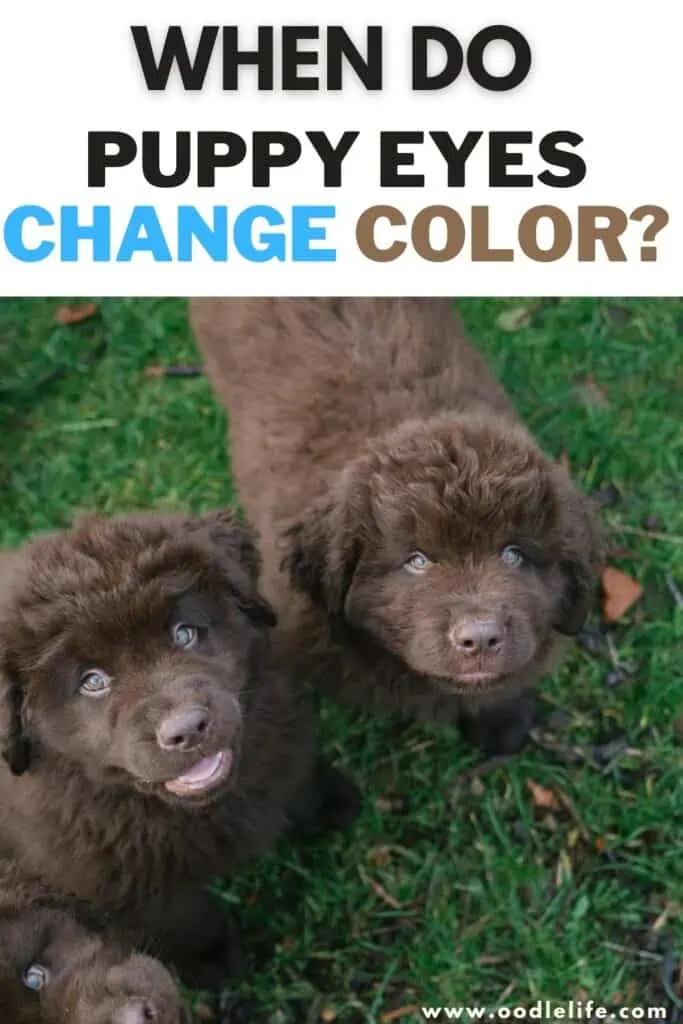
Puppy Eyesight Initially
In the beginning, puppies, like kittens, keep their eyes closed. Not only that, but newborn puppies are blind and deaf. Little wonder they get to be so reliant on their noses.
But the condition isn’t permanent, and puppies open their eyes typically between two and three weeks into puppyhood. This is when you are most likely to notice the nascent blue eye color.
As puppies age, their vision solidifies, moving from a hazy, Monetesque impression of the world to something more clearly defined. Their hearing develops similarly.
When Does a Puppy Eye Color Begin Changing?
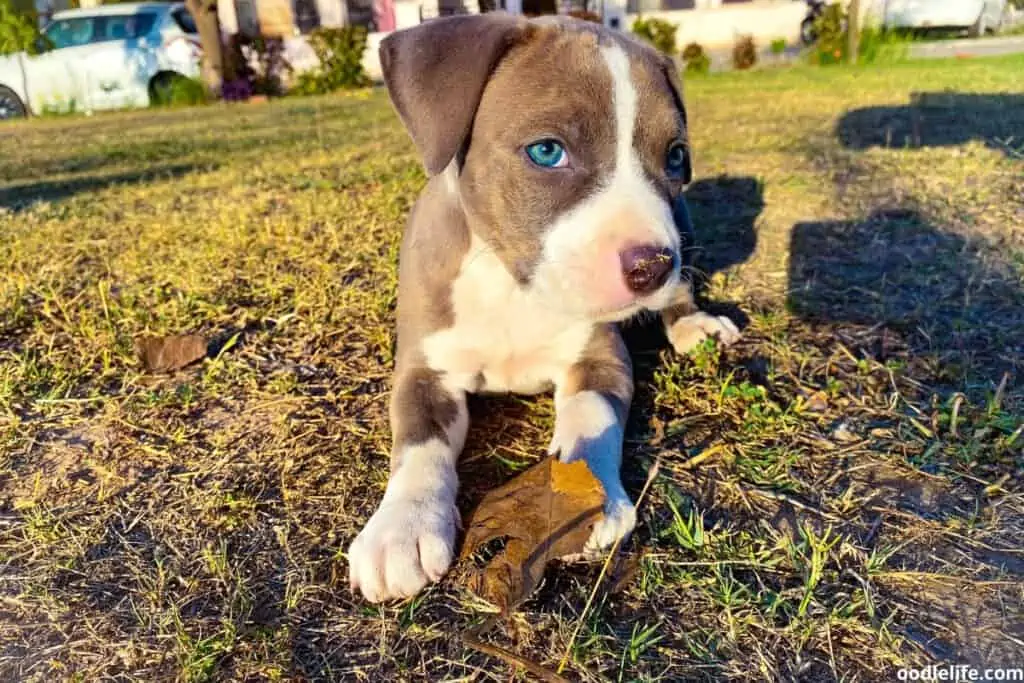
Once a newborn puppy’s eyes are open, they look blue. But as their eyesight develops, your puppy’s eye color starts changing.
This is when puppy eye color shifts from blue to brown or green. However, the change doesn’t happen overnight, and it will take a while for the color to resolve itself. Over the next few weeks, you’ll be able to watch your puppy’s eye color darken.
By the time you can take your puppy home at 12 weeks, their eyes should finally have resolved into their adult color.
But not all dogs’ eyes darken.
What about Puppies Whose Eyes Stay Blue?
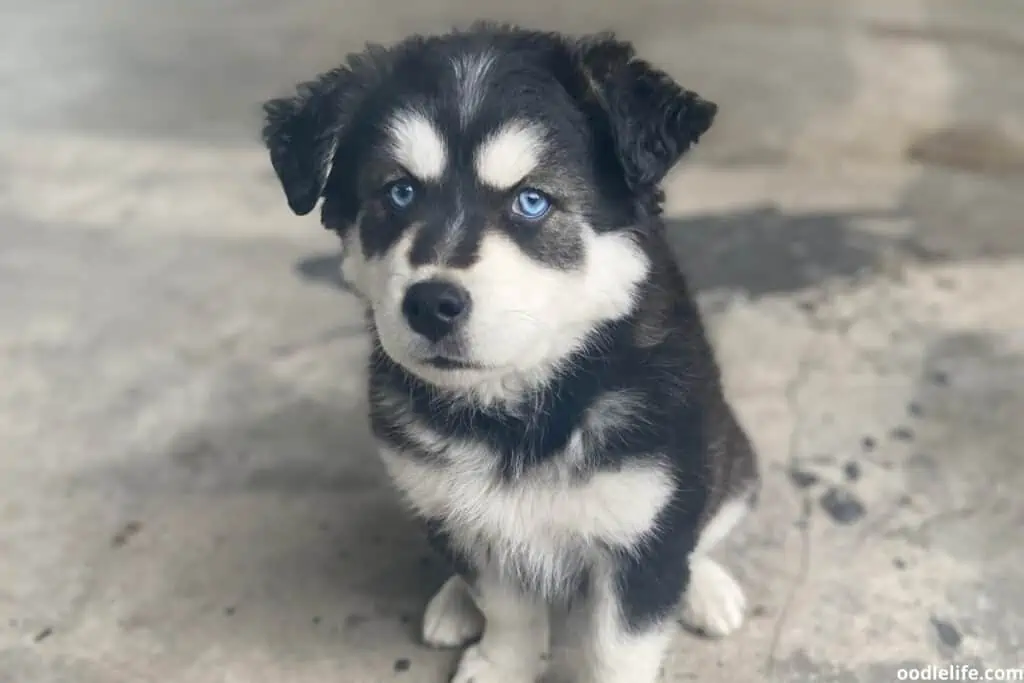
Some breeds, like Huskies and Australian Shepherds, are famous for their blue eyes. While handsome, this isn’t usual.
Which Dogs Have Blue Eyes? [11 Breeds with Photos]
Interestingly, the gene behind your dog’s atypical eye color is not the same one responsible for dilute coats.
Researchers found that while the Merle gene was behind the Australian Sheepdog’s coat, it was the ALX4 gene on chromosome 18 that determined whether dogs, like Huskies, had blue eyes.
But having the gene isn’t enough to give dogs blue eyes. As with people, blue eyes in dogs are recessive. That means that if they carry ALX4 and a gene for a more dominant eye color, like green or brown, your puppy’s eye color changes to brown or green at the maturation point.
Only dogs with duplicate copies of the appropriate recessive gene demonstrate blue eyes, making them unique from their canine contemporaries.
Besides Australian Shepherds and Huskies, other dogs that can inherit blue eyes include
- Welsh Corgi
- Border Collies
- English Sheepdog
Will My Puppy Keep Their Blue Eyes?
Around 3 or 4 weeks in age, puppies’ final eye color slowly starts to become visible.
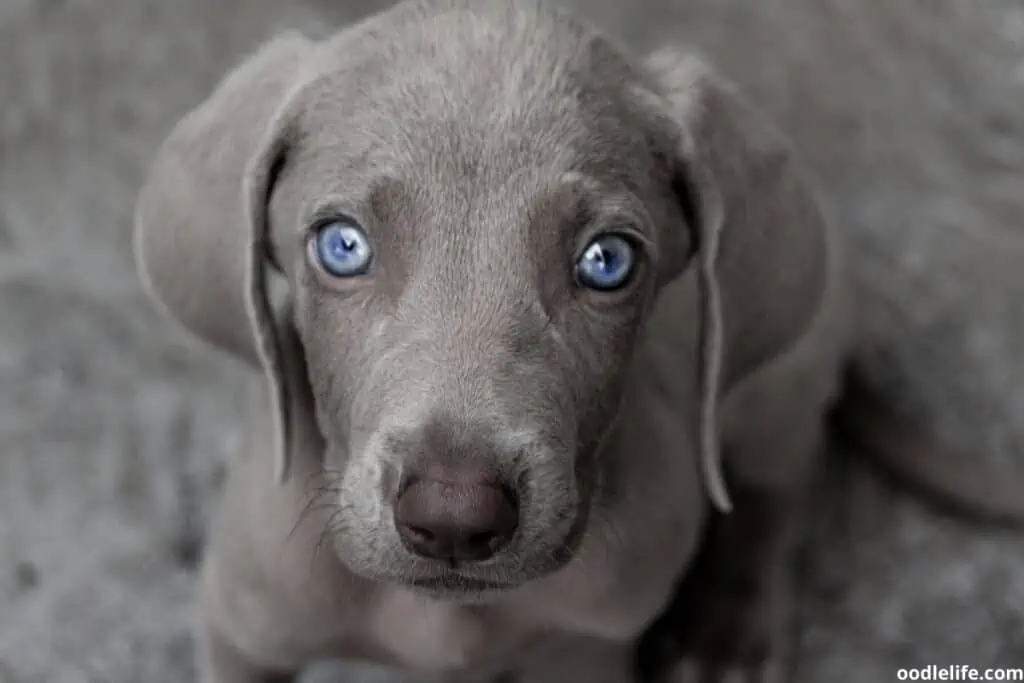
If all the talk of genes and chromosomes becomes complicated, the best way to tell if your puppy’s eye color will change from blue to something else is to look at the parents. If both dogs have blue eyes, your puppy’s eyes may not change.
However, if one of the breeding pairs has a dominant eye color, you can expect your puppy’s eye color to change around the twelve-week mark. That said, a dog expressing a dominant eye color can still carry the recessive gene to help produce a blue-eyed puppy. So, you won’t know until your puppy’s eyes settle.
Why Are Puppies Eyes Blue at Birth?
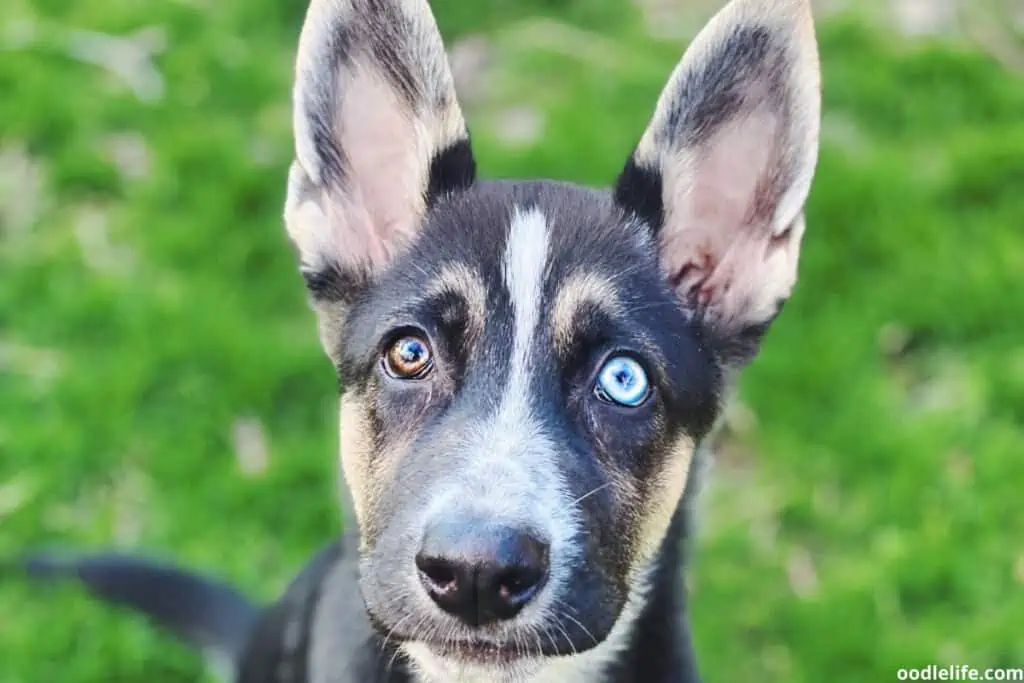
So, that’s how to tell if your puppy’s eye color will change and when it will happen. But why do puppies have blue eyes in the first place?
The fact is that puppies’ eyes aren’t really blue. The irises are almost colorless, which also explains their early blindness. That’s because, instead of reflecting light outward to produce images, it refracts inward, a bit like being perpetually exposed to a camera flash.
The other factor that contributes to puppies’ blue eye color is a lack of melanin. Melanin handles pigment color, so when it’s low, things like irises get diluted or end up clear.
When they’re born, puppies have naturally low melanin levels. That, combined with the light reflecting off those clear irises, makes them appear blue to the casual observer.
When puppies finally begin producing higher melanin levels, their eye color starts darkening, and that’s when you notice a puppy’s eye color changing.
Does Puppy Coat Color Affect Eye Color?
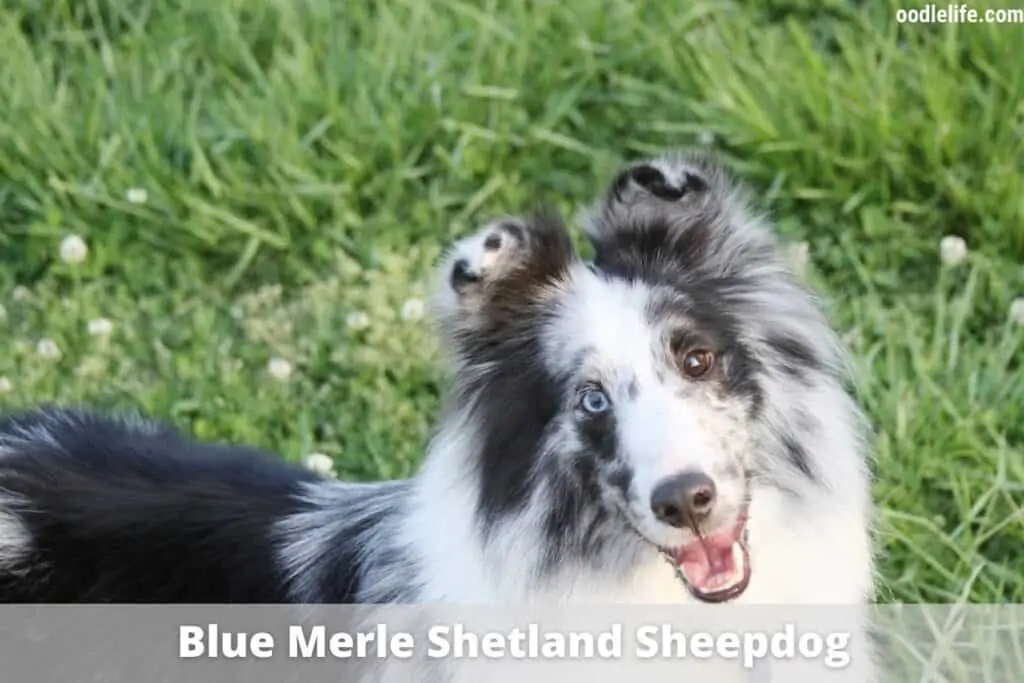
Although the genes for coat and eye color are different, there is a strong correlation between coat pattern and eye color in dogs.
For instance, a liver-spotted or liver-colored dog typically has amber eyes. The genetic quirk that creates the dilute coat gets reflected in similarly lightened eyes.
Dogs with the Merle gene are also more likely to express a blue or dilute coat. By extension, they might inherit blue eyes. However, this isn’t necessarily because the dog carries the Merle gene. Rather, the Merle gene, like the gene for eye color, is recessive, and your puppy’s DNA is predisposed to exhibit certain recessive genes.
Also, not all dilute dogs have similarly diluted eye color. We have a blue dachshund whose color is recessive but has dark brown eyes.
What Puppy Eye Color is Most Common?
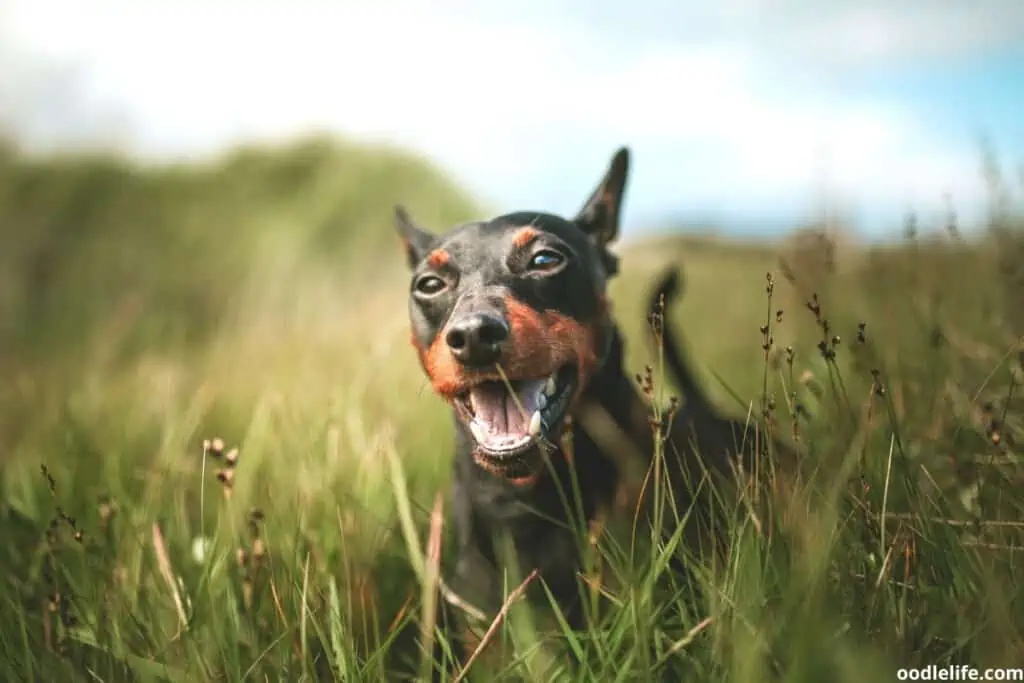
With that in mind, what eye color can you expect to see when your puppy’s eyes change color?
Both brown and green are dominant eye colors for dogs, and these are the colors you are most likely to see when your puppy’s eyes change color. That said, no two dogs are exactly the same, and there’s a lot of room for variation for the shade of brown.
As a rule of thumb, lighter-colored dog coats pair with light brown eyes, like amber, while black dogs may have eyes that look almost black.
Another factor affecting eye color is eye shape. Our blue dog is a dachshund, and the peculiar eye shape means that although his eyes are brown, the iris is hard to see, while the black pupil is prominent. So, you may not notice your dog’s adult eye color when looking at them casually.
Conclusion
When and why your puppy’s eyes change color has a lot to do with age and pigmentation. But breed and coat color can also play a part.
Some puppies’ eyes never change color, and one way to find out if your puppy is among them is by looking at the parents’ eyes.
Watching a puppy’s eye color change can be exciting and may even help you get to know your puppy a bit better. But we also don’t think it’s something you need to agonize over. Our dogs inform us that as long as those wide, beseeching eyes can see well enough to steal food, you’ve done your job as their owner correctly.